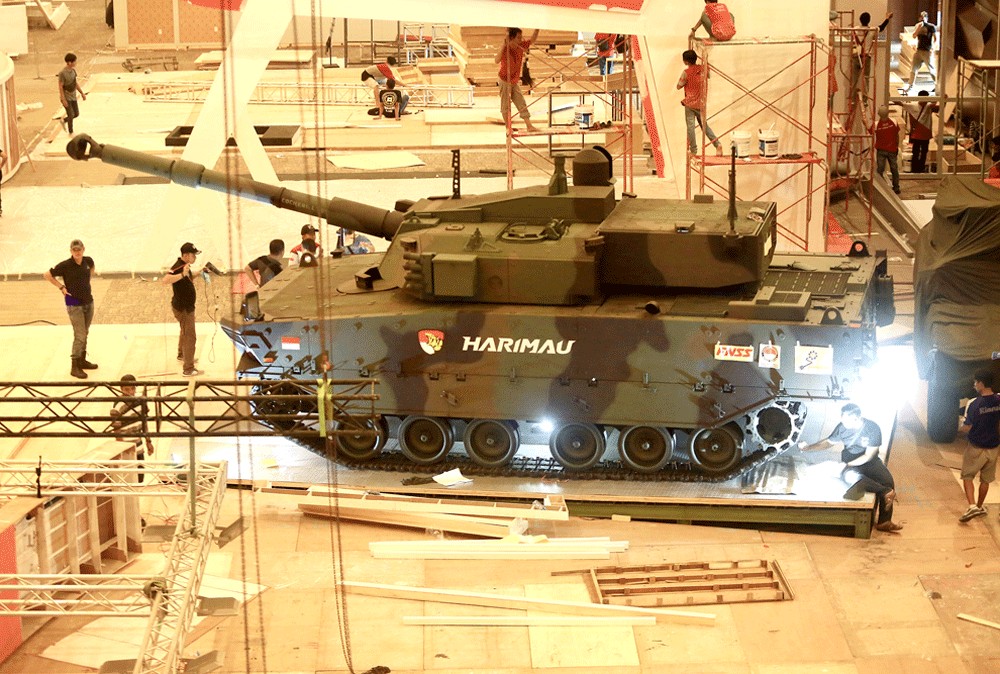Jobs law stirs debate on defense industry
Private investors, both local and foreign, can now participate in the procurement of defense products.
Change Size

T
he passage of the Job Creation Law has sparked worries about opening the defense industry to the private sector and foreign investors, while private enterprises assert that the step is needed for the industry’s revival.
Defense expert Al Araf said allowing private enterprises into the nation’s defense industry could be harmful as it would spur competition that could obstruct strategic military affairs and weaken defense-related state-owned enterprises (SOEs), which already faced mismanagement, budget shortages and a lack of locally sourced components.
“This [omnibus law] could potentially kill local [defense] industries,” said Al Araf, who is also the director of human rights group Imparsial. He called for a judicial review or a regulation in lieu of law (Perppu) to revise the omnibus law.
He pointed to Article 74 of the omnibus law, which facilitated licensing for private enterprises for both the production of raw materials and components and their integration into higher-order products to make weapons, military vehicles and other military gear. The companies responsible for this higher-order production are called “lead integrators”.
Law No. 16/2012 on the defense industry, which was partially amended by the omnibus law, allowed only SOEs to serve as lead integrators to maintain national military technology secrets, observers have said.
Al Araf added that removing Article 12 of the Defense Industry Law, which regulates the “production of weapons, gunpowder, explosives and war equipment”, from the negative investment list meant local and foreign investors could now participate in the procurement of these products.
In addition, private sector players are not required to follow the “offset mechanism”, where buyers of military equipment receive benefits through the transfer of technology, training or other forms of compensation.
Al Araf said this mechanism was crucial for the development of the local defense industry’s ability to create its own products.
In the long run, he said, Indonesia would depend on private sector players to fulfill its national defense needs if they were allowed to co-opt such affairs, making Indonesia vulnerable because of a limited production capacity without the private sector.
While national data on the production of weaponry and military equipment is not publicly available, data shows that Indonesia imports more defense and security-related commodities than it exports.
Two separate Statistics Indonesia (BPS) bulletins showed that Indonesia exported US$231,540 worth of “arms and ammunition; parts and accessories thereof” from January to July, a fraction of the $251.7 million in imports of such commodities during the same period.
Dahnil Anzar Simanjuntak, a spokesman for Defense Ministrer Prabowo Subianto, told The Jakarta Post on Oct. 21 that various implementing regulations would put the Defense Ministry "in control" of the defense industry amid greater private sector involvement.
“This is because it is impossible for the government to haphazardly open up the defense industry to the private sector or foreign [parties]. [The industry] is controlled, rather, by the Defense Ministry,” he said.
He noted that the government had been controlling the defense industry through regulations and licenses, adding that the private sector’s involvement aimed to accelerate the government’s progress in the development of the industry.
SOEs such as weapons manufacturer PT Pindad, aircraft manufacturer PT Dirgantara Indonesia and shipbuilder PT PAL have typically taken the lead in the nation’s defense industry.
National Private Defense Industry Association (Pinhantanas) chairman Jan Pieter Ate called the omnibus law a “breakthrough” on Saturday, saying the nation had seen minimal results from the SOE-centered defense industry over the last 75 years.
“SOEs have already been given 75 years and we, as the nation’s people, wonder, ‘What have they done in the last 75 years? Or should we wait again for another 75 years?’,” said Jan, who is a former Defense Ministry director for the defense industry and technology.
He denied that giving more room to the private sector would “kill” domestic defense enterprises, arguing that the omnibus law would allow investments that would provide much-needed transfers of technology, which would improve the industry’s capacity to create its own defense products in the future.
He also brushed off concerns about looming competition and the lack of an offset mechanism, saying that competition would push SOEs to improve themselves and that the transfer of technology stemming from foreign investment would make the offset mechanism unnecessary in the long run.
Indonesian Chamber of Commerce and Industry (Kadin) vice chairman for industrial affairs Johnny Darmawan praised authorities on Wednesday for being more open to the private sector in the defense industry and for facilitating investment in the sector.
However, he urged the government to set clear boundaries between private companies and SOEs in the industry’s value chain according to each institution’s competence in order to promote cooperation instead of competition.
“If the government, SOEs and the private sector could be united as one, it would be extraordinarily good,” he said.









